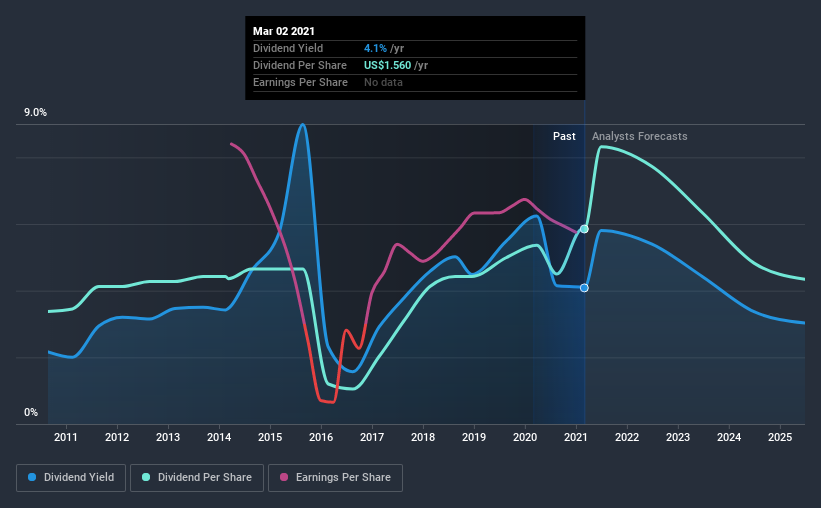Left Until BHP Group (ASX:BHP) Trades Ex-Dividend
Readers hoping to buy BHP Group (ASX:BHP) for its dividend will need to make their move shortly, as the stock is about to trade ex-dividend. If you purchase the stock on or after the 4th of March, you won't be eligible to receive this dividend, when it is paid on the 23rd of March.
BHP Group's next dividend payment will be US$1.01 per share. Last year, in total, the company distributed US$1.56 to shareholders. Looking at the last 12 months of distributions, BHP Group has a trailing yield of approximately 4.1% on its current stock price of A$49.13. If you buy this business for its dividend, you should have an idea of whether BHP Group's dividend is reliable and sustainable. So we need to check whether the dividend payments are covered, and if earnings are growing.
Check out our latest analysis for BHP Group
Dividends are typically paid out of company income, so if a company pays out more than it earned, its dividend is usually at a higher risk of being cut. BHP Group distributed an unsustainably high 113% of its profit as dividends to shareholders last year. Without more sustainable payment behaviour, the dividend looks precarious. Yet cash flows are even more important than profits for assessing a dividend, so we need to see if the company generated enough cash to pay its distribution. It paid out more than half (56%) of its free cash flow in the past year, which is within an average range for most companies.
It's disappointing to see that the dividend was not covered by profits, but cash is more important from a dividend sustainability perspective, and BHP Group fortunately did generate enough cash to fund its dividend. Still, if the company repeatedly paid a dividend greater than its profits, we'd be concerned. Very few companies are able to sustainably pay dividends larger than their reported earnings.
Click here to see the company's payout ratio, plus analyst estimates of its future dividends.
Have Earnings And Dividends Been Growing?
Companies with consistently growing earnings per share generally make the best dividend stocks, as they usually find it easier to grow dividends per share. If earnings fall far enough, the company could be forced to cut its dividend. For this reason, we're glad to see BHP Group's earnings per share have risen 16% per annum over the last five years.
Another key way to measure a company's dividend prospects is by measuring its historical rate of dividend growth. BHP Group has delivered 5.7% dividend growth per year on average over the past 10 years. It's good to see both earnings and the dividend have improved - although the former has been rising much quicker than the latter, possibly due to the company reinvesting more of its profits in growth.
The Bottom Line
Is BHP Group an attractive dividend stock, or better left on the shelf? BHP Group has been growing its earnings per share nicely, although judging by the difference between its profit and cashflow payout ratios, the company might have reported some write-offs over the last year. While it does have some good things going for it, we're a bit ambivalent and it would take more to convince us of BHP Group's dividend merits.
With that being said, if dividends aren't your biggest concern with BHP Group, you should know about the other risks facing this business. To help with this, we've discovered 2 warning signs for BHP Group (1 is concerning!) that you ought to be aware of before buying the shares.
We wouldn't recommend just buying the first dividend stock you see, though. Here's a list of interesting dividend stocks with a greater than 2% yield and an upcoming dividend.
This article by Simply Wall St is general in nature. It does not constitute a recommendation to buy or sell any stock, and does not take account of your objectives, or your financial situation. We aim to bring you long-term focused analysis driven by fundamental data. Note that our analysis may not factor in the latest price-sensitive company announcements or qualitative material. Simply Wall St has no position in any stocks mentioned.
Have feedback on this article? Concerned about the content? Get in touch with us directly. Alternatively, email editorial-team (at) simplywallst.com.


